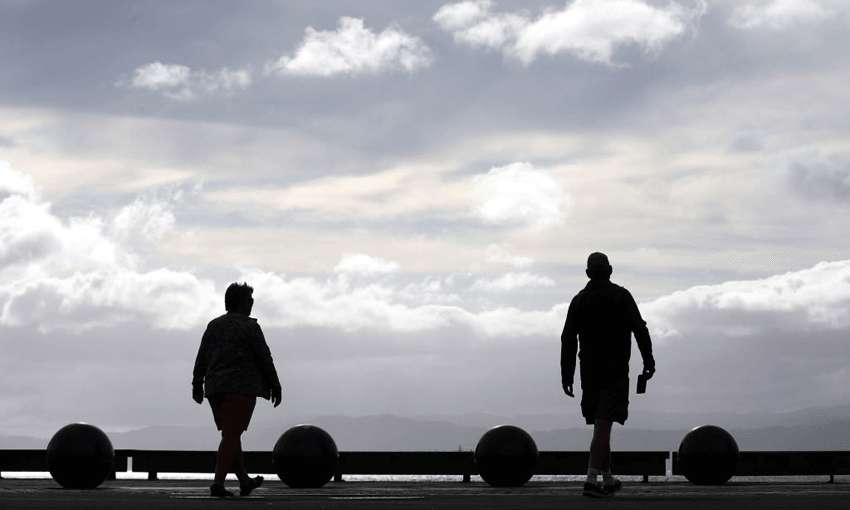Reverend Scottie Reeve on the meaning of Easter during the Covid-19 pandemic, and why we need to embark on a journey of collective repentance.
On Wednesday while I was going for a walk, I came across a friend on the Wellington waterfront. We’ll call him David. David had no idea what was happening at the moment. He asked me, “Where is everyone? What’s going on?” To him, Wellington had taken on the feel of a post-apocalyptic wasteland. As he spoke he broke a piece off the corner of a ginger loaf and held it out to me. I didn’t know what to do; so cautiously and unwisely I partook. As an Anglican priest I couldn’t help but feel David had offered me communion. Who was I to refuse Jesus’s ginger body?
David lives in council housing, and awoke one day to find many of the services that help him day-to-day had closed down. He didn’t know where to find food, where to find friends, or when this strange joke would be over. New Zealand society had moved quickly, and David had been left behind. For me, it was a moment of awakening.
My wife and I share a house with a friend of ours in a relatively affluent nearby suburb. We’ve actually been enjoying this time. A slower pace of life, quieter streets, and the three of us all endeavouring to not cook the same meal twice during lockdown. Most evenings we sit and watch the news together with a glass of wine. An experience far removed from David’s time in lockdown so far. It was while I was sitting there eating my Covid-saturated-ginger-eucharist with David that I realised something.
Social distancing is nothing new.
As a society, we’ve been avoiding those most vulnerable to Covid-19 our whole lives. We’ve been socially distant from David. We’ve been socially distant from the poor in our neighbourhoods, the elderly in homes, the immigrant, the refugee, and the indigenous. And even worse than being distant, we’ve also talked about “these people” and what they need while we distance from them.
The Catholic liberation theologian Gustavo Gutierrez said it best: “You say you care about the poor, then tell me, what are their names?” We need to pause carefully and ask ourselves Gutierrez’s question. Perhaps the next time we are preparing a Facebook post advocating on behalf of those most vulnerable, we might stop and ask ourselves, “When was the last time one of the people I’m talking about sat at my dinner table?”
Currently, followers of the Nazarene refugee revolutionary find ourselves in the middle of a season called Lent. It’s a dark time in our church calendar, which you may have heard about when a colleague decided to abstain from chocolate, but it’s more than that. This is the season when we reflect on Christ’s journey to the cross. In this time, we are walking that road of crucifixion with him, and we are undertaking a kind of spiritual death.
At the beginning of this journey we say the phrase, “you are but dust, and to dust you shall return”. It’s a time of repentance, sadness and lamentation where we reckon with who we are, and with the kind of society that kills an innocent man by capital punishment. In this time, we long for a new way of being human. And in this time, there’s something I can’t stop thinking about.
I think Aotearoa needs a national lent. And I think now, in lockdown, is the perfect moment.
We need a time of reckoning with our past and of putting down our life-long posture of social distancing. A time when we are less focused on who the government is or isn’t helping, and asking ourselves whether we truly know the names beneath the issues we discuss over dinner. We need a journey of collective repentance for our individualism, our elitism, and our white and western supremacism.
And after that, when we are free again to leave our homes, I hope we’ll rise with a different posture.
Because the Easter season doesn’t end at Lent. It ends with Resurrection Sunday. The day when Christians celebrate that all the powers of death and destruction in the cosmos were overcome by self-sacrificing love. We believe that this kind of sacrifice has opened a revolutionary new way to know and love each person by name. This day of new life will fall right in the middle of our four week lockdown, and I think that’s a powerful invitation.
Of course we know that this is not just a pandemic that affects Aotearoa. We must be mindful of the global scale of this crisis and we need to get to know the names of people and places that are often far too distant from our memory as well. And yet I still have some specific hopes for our little island nation during this season of lenten lockdown.
I hope this time causes us to reckon with our past. I hope we will repent of self-interest. I hope we will develop courage to know the names of those we’ve often talked about, rather than to – kanohi ki te kanohi. And I hope – and even pray – that when we rise from this time, we will leave our homes a more compassionate, more loving, and more truly honest Aotearoa.
Scottie Reeve is an Anglican priest from Brooklyn, Wellington.



